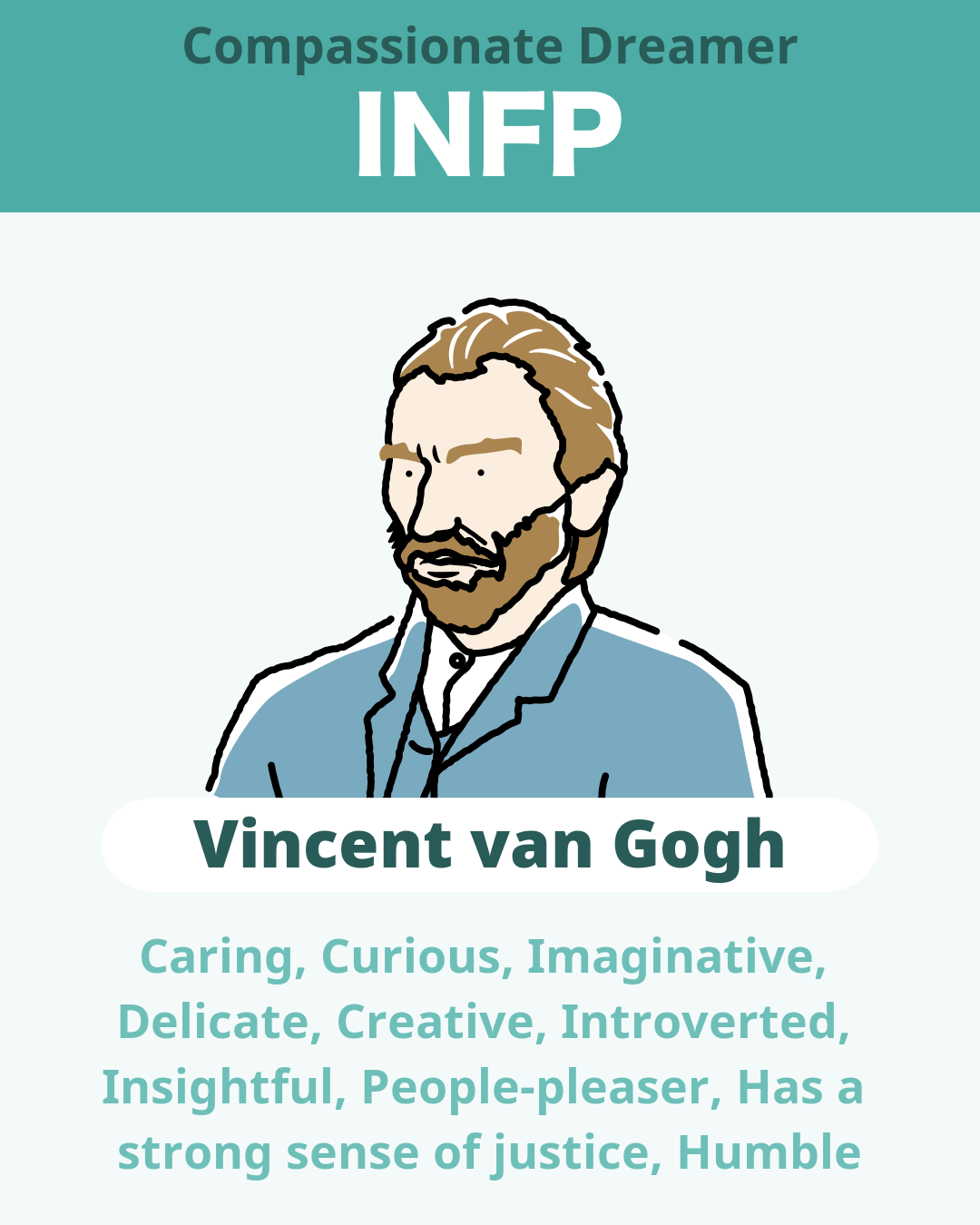
People with the INFP personality type, also known as the Mediator personality type, have a gentle nature, a sensitive soul, and are considerate of those around them. They help those in need without asking for anything in return. INFPs value their dreams and ideals, and while they are modest and flexible enough to adapt to others, they are unwilling to compromise when it comes to the ideals they treasure. They are not good at putting themselves out there, and prefer to maintain a small social circle with deep friendships. INFPs are sensitive and curious, making them suitable for creative work. However, they are not mentally resilient, and can be greatly hurt when criticized by others. They can easily drop into a negative state of mind, such as when they get depressed because they are failing to realize their own lofty goals, so INFPs should take care not to let their self-esteem drop too low.





| Ranks | Types | % | |
|---|---|---|---|
| 1 | INFP | Vincent van Gogh★ | 13% |
| 2 | ENFP | Anne Frank | 11% |
| 3 | ISFP | Mozart | 8% |
| 4 | INTP | Albert Einstein | 8% |
| 5 | INFJ | Nightingale | 8% |
| 6 | ESFJ | Andrew Carnegie | 7% |
| 7 | ISFJ | Mother Teresa | 7% |
| 8 | ESFP | Marie Antoinette | 6% |
| 9 | ENTP | Thomas Edison | 6% |
| 10 | ENFJ | Joan of Arc | 5% |
| 11 | ISTJ | Sigmund Freud | 4% |
| 12 | ISTP | Spartacus | 4% |
| 13 | INTJ | Leonardo da Vinci | 4% |
| 14 | ESTJ | George Washington | 3% |
| 15 | ESTP | Columbus | 3% |
| 16 | ENTJ | Napoleon | 3% |
INFP stands for Introversion, Intuition, Feeling, and Judging. The INFP personality type is often called the firm's healer, mediator, and idealist. INFPs are often seen as shy and quiet but have a lively inner life.
They are naturally curious and creative and like to daydream and develop new problem-solving methods. They are also perfectionists who stick to a strong set of core matters and beliefs as they pursue their purpose and reach. This guide will provide you with all the details about this personality profile.
INFP is an abbreviation for an introverted, intuitive, feeling, and perceiving Myers-Briggs personality type. People with the INFP personality type are often called mediators because they usually help the people around them respond with empathy.
INFPs are usually quiet on the outside, but their inner lives are creative and imaginative, full of daydreaming and making up stories. Since INFPs are known for their high level of sensitivity, nature, art, music, and other things often make them feel very strongly.
INFPs can have deep and meaningful relationships with others because they are sensitive. INFPs may spend many lives wanting to build these relationships and might even feel called to use their jobs to help others.
Many INFPs can feel like they don't have a purpose in life until they find one. Finding a life purpose where they can help others and connect with them can inspire INFPs. This kind of involvement can be hard, particularly for INFPs, who sometimes use too much energy and compassion on idealistic projects.
INFPs are very committed to being real because of this. INFPs often have a clear commitment to truth and self-expression, leading many to pursue creative projects. INFPs can connect with others over their deepest thoughts when doing these things.
Overall, INFPs are empathetic, which lets them act in a vulnerable way and think about things that aren't in their current reality. This can be a hard task, especially for INFPs who tend to daydream, but most INFPs learn how to deal with this. They are mostly good at finding their position globally and making their dreams come true.
Because they care about others, INFPs might use their natural strengths to make a difference. Here are some of the things that people with the INFP personality type tend to do well:
Because INFPs are good at understanding how other people feel and are genuinely interested in them, they can tailor their approach to each person and make them feel important and valued. They are known as "the mediator" and pay attention to how their decisions will make people feel, ensuring never to hurt anyone.
INFPs are creative and open-minded and aren't afraid to try new things. Because they can see patterns and connections in things and situations, they can develop new ways to solve hard problems. These independent thinkers are also drawn to creative expression because of how creative they are. A study found that gifted students tend to fall into four personality types, one of which is INFP.
Being sensitive to other people's needs and feelings lets INFPs see things from other perspectives. This makes them generally open to other people's lifestyles and beliefs and tolerant of them.
INFPs are often called "healers " because they naturally desire to help others and constantly look for ways to do so. They give them all to those they care about, whether it's a person, a cause, or what they see as their calling and purpose.
Being idealists, these INFPs are often caused by a plan that involves bringing care of and meeting other people's requirements. They see the world through the lens of their basic values and are not likely to change their minds easily.
The strengths of an INFP often come with blind spots that could cause problems if they are not managed. Here are some of the weaknesses of the INFP personality type that they should be aware of:
INFPs driven by a vision may become perfectionists who expect everything to have a purpose. They tend to idolize people they admire, leading to anger and dissatisfaction when those people don't live up to their ideals.
Because they are private and shy, INFPs may find it hard to talk about themselves or their achievements. This could make asking for help or talking to new people hard.
Mediators avoid confrontations and fights at all costs, which often works against them. Because they like to make others happy, they may forget about their emotions and requirements. This makes them aware of how other people feel about them.
Because they have high standards for themselves, these idealists tend to be hard on themselves. Because of this, they tend to think about what went wrong. INFPs worry a lot about how other people see them, and they may take criticism individually, getting angry when others see their words or conduct in a bad light. This habit of being too hard on themselves could hurt their mental health.
INFPs tend to focus too much or get too caught up in their feelings, making it hard to see things.
INFPs like jobs that align with their values and allow them to help others. They are more productive in small groups and like jobs that give them new opportunities and room to move around. INFP jobs and careers all have one thing in common: they give people with this personality type the freedom and independence they want.
INFPs like to hang out with their close group of friends. They try to make friends with people who share one's beliefs and values, but they are open to making friends with anyone. They can keep friendships that are stable and strong. Like other introverts, people with this personality type may need to be alone to get their energy back. INFPs value their friendships and make them stronger by spending time with them.
INFPs want to help other people learn and grow, so they see being a parent as a unique way to live a meaningful life. Parents allow their kids to find their interests and develop their personalities. But they want to teach their children important things, like how to be kind and care about others.
INFP parents want their homes to be peaceful and do their best to set a good example for their kids. They don't set too many strict rules or too much structure in the home, and they let their kids have a say in what happens there.
This type's idealism fits with what they think of as real love. They may find themselves fantasizing about their perfect mate and picturing spending their life with them, building strong relationships. This lets them look beyond how they look on the outside and concentrate more on who they are.
But these idealists might have standards for the people they want to date. In a relationship, an INFP will use their kindness and care to make their partner feel important. INFPs love their partners for their unique qualities, but they also work hard to help them grow and reach their goals.
INFPs are driven by a sense of purpose, so they will look for a moral connection and prefer to work where their values are shared. INFPs enjoy making their bosses and customers happy at work.
People with this personality type can be hard on themselves, making it hard for them to work for negative bosses or in hostile places of business. People with the INFP personality type like being free and independent and prefer using their creativity to get things done. Still, deadlines and a little structure help them stay on track.
INFPs are one of the 16 personality types on the Myers-Briggs Type Indicator (MBTI) that show the most care and compassion. This, along with the fact that they are passionate and caring, makes them an excellent source of hope and inspiration for the people around them.
Their idealism and sensitivity help them do what they want, which is to help other people, but they can also be problems if they are not managed. They might need to be aware of their weaker traits, particularly if they want to keep a romantic relationship going, make and keep friends, or have a career that gives them meaning.